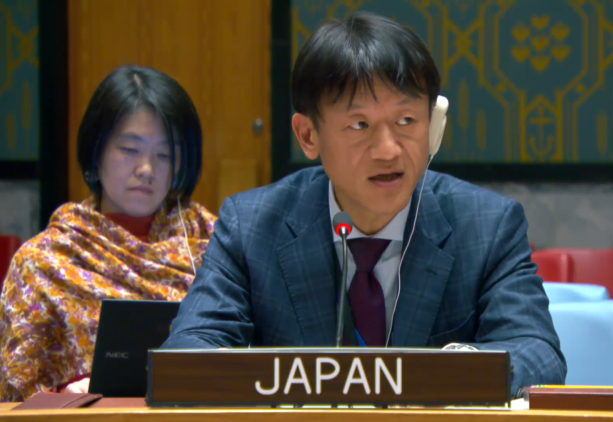中部アフリカ地域情勢に関する安保理ブリーフィングにおける入谷公使ステートメント
令和5年12月13日

(As delivered)
Thank you, Mr. President
I thank SRSG Abarry for the briefing.
As the region continues to face multifaceted challenges, including the persistent threat of terrorism and conflicts as well as fragility of political systems, the good offices role of UNOCA is essential in upholding fundamental values and strengthening the capacity of subregional organisations for conflict prevention, mediation and peace consolidation.
In this regard, we appreciate the mediation efforts by UNOCA following the military takeover of power in Gabon earlier this year. We welcome the subsequent announcement by the Gabonese authority of a roadmap for a democratic transition and presidential elections tentatively scheduled for August 2025.
On the political front, we note the two key events which will take place in the region later this month: the constitutional referendum in Chad on the 17th, a milestone on the transition to civilian rule, and the general elections on the 20th in the DRC. It is vital that both be conducted in a free, fair, peaceful, transparent, and inclusive manner.
On the security front, we remain deeply concerned by continued violence in the North-west and South-west regions of Cameroon and deeply regret the targeting of civilians and attacks against schools and hospitals. We call on the Government of Cameroon to constructively engage towards reconstruction and development in these areas, based on the 2019 National Dialogue.
Central African region continues to face dire humanitarian situation. This is further exacerbated by the adverse effects of climate change such as food insecurity, forced displacements and farmer-herder conflicts. Japan commends the countries’ and the subregional organisations’ efforts to address climate, peace and security. Japan further welcomes the continued engagement by UNOCA with the ECCAS Commission on the development of a conflict-sensitive regional strategy on climate change and resilient development.
Mr. President,
In tackling the region’s multi-layered challenges, I want to highlight three points.
The first is the centrality of good governance based on the rule of law. To attain sustainable peace and security, governments must be able to provide basic services for their citizens and earn the trust and respect of the population. In order to do so, solid and resilient institutions supported by empowered human capital and strong communities are needed. Communities with high levels of trust can collectively face up to the threats of insecurity, radicalization, and environmental change.
Secondly, all endeavours must be inclusive and heed the voices of women, youth and marginalized groups. People must feel that they are the agents of change in their societies. Without it, no government, institutions, or communities can gain trust.
Thirdly, in supporting such efforts, the international community must adopt a holistic approach based on the humanitarian-development-peace (HDP) nexus, incorporating the entire UN system, as well as international financial institutions, regional organizations, and civil society.
Mr. President,
Japan has long provided support to countries in the region, notably to countries who are generously hosting large numbers of displaced people, including Cameroon, Central African Republic, and Chad. Japan reaffirms its continued support in their endeavour to tackle the many challenges and pursue peace and stability.
I thank you.
